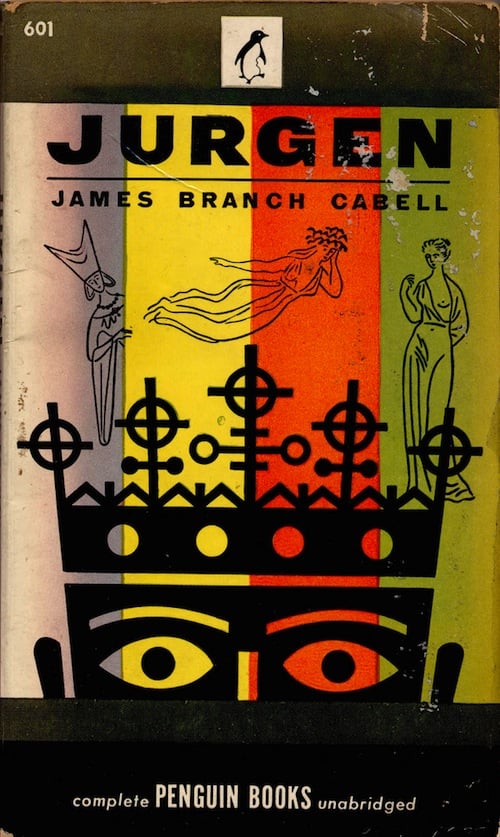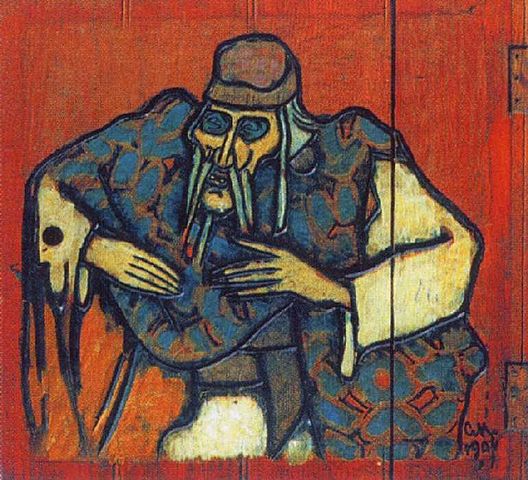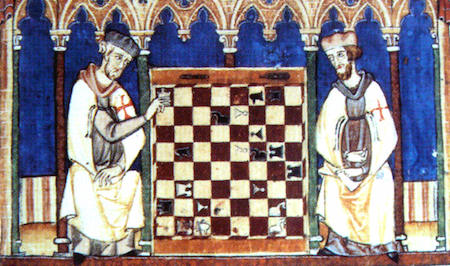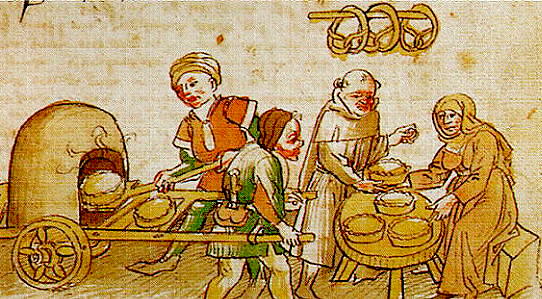Jurgen (44)
By:
January 16, 2016

James Branch Cabell’s 1919 ironic fantasy novel Jurgen, A Comedy of Justice, the protagonist of which seduces women everywhere he travels — including into Arthurian legend and Hell itself — is (according to Aleister Crowley) one of the “epoch-making masterpieces of philosophy.” Cabell’s sardonic inversion of romantic fantasy was postmodernist avant la lettre. HiLoBooks is pleased to serialize Jurgen here at HILOBROW. Enjoy!
Thus Jurgen stood again upon Amneran Heath. And again it was Walburga’s Eve, when almost anything is rather more than likely to happen: and the low moon was bright, so that the shadow of Jurgen was long and thin. And Jurgen searched for the gold cross that he had worn through motives of sentiment, but he could not find it, nor did he ever recover it: but barberry bushes and the thorns of barberry bushes he found in great plenty as he searched vainly. All the while that he searched, the shirt of Nessus glittered in the moonlight, and the shadow of Jurgen streamed long and thin, and every movement that was made by Jurgen the shadow parodied. And as always, it was the shadow of a lean woman, with her head wrapped in a towel.
Now Jurgen regarded this shadow, and to Jurgen it was abhorrent.

“Oh, Mother Sereda,” says he, “for a whole year your shadow has dogged me. Many lands we have visited, and many sights we have seen: and at the end all that we have done is a tale that is told: and it is a tale that does not matter. So I stand where I stood at the beginning of my foiled journeying. The gift you gave me has availed me nothing: and I do not care whether I be young or old: and I have lost all that remained to me of my mother and of my mother’s love, and I have betrayed my mother’s pride in me, and I am weary.”
Now a little whispering gathered upon the ground, as though dead leaves were moving there: and the whispering augmented (because this was upon Walburga’s Eve, when almost anything is rather more than likely to happen), and the whispering became the ghost of a voice.
“You flattered me very cunningly, Jurgen, for you are a monstrous clever fellow.” This it was that the voice said drily.
“A number of people might say that with tolerable justice,” Jurgen declared: “and yet I guess who speaks. As for flattering you, godmother, I was only joking that day in Glathion: in fact, I was careful to explain as much, the moment I noticed your shadow seemed interested in my idle remarks and was writing them all down in a notebook. Oh, no, I can assure you I trafficked quite honestly, and have dealt fairly everywhere. For the rest, I really am very clever: it would be foolish of me to deny it.”
“Vain fool!” said the voice of Mother Sereda.
Jurgen replied: “It may be that I am vain. But it is certain that I am clever. And even more certain is the fact that I am weary. For, look you, in the tinsel of my borrowed youth I have gone romancing through the world; and into lands unvisited by other men have I ventured, playing at spillikins with women and gear and with the welfare of kingdoms; and into Hell have I fallen, and into Heaven have I climbed, and into the place of the Lord God Himself have I crept stealthily: and nowhere have I found what I desired. Nor do I know what my desire is, even now. But I know that it is not possible for me to become young again, whatever I may appear to others.”
“Indeed, Jurgen, youth has passed out of your heart, beyond the reach of Léshy: and the nearest you can come to regaining youth is to behave childishly.”

“O godmother, but do give rein to your better instincts and all that sort of thing, and speak with me more candidly! Come now, dear lady, there should be no secrets between you and me. In Leukê you were reported to be Cybelê, the great Res Dea, the mistress of every tangible thing. In Cocaigne they spoke of you as Æsred. And at Cameliard Merlin called you Adères, dark Mother of the Little Gods. Well, but at your home in the forest, where I first had the honor of making your acquaintance, godmother, you told me you were Sereda, who takes the color out of things, and controls all Wednesdays. Now these anagrams bewilder me, and I desire to know you frankly for what you are.”
“It may be that I am all these. Meanwhile I bleach, and sooner or later I bleach everything. It may be that some day, Jurgen, I shall even take the color out of a fool’s conception of himself.”
“Yes, yes! but just between ourselves, godmother, is it not this shadow of you that prevents my entering, quite, into the appropriate emotion, the spirit of the occasion, as one might say, and robs my life of the zest which other persons apparently get out of living? Come now, you know it is! Well, and for my part, godmother, I love a jest as well as any man breathing, but I do prefer to have it intelligible.”
“Now, let me tell you something plainly, Jurgen!” Mother Sereda cleared her invisible throat, and began to speak rather indignantly.
“Well, godmother, if you will pardon my frankness, I do not think it is quite nice to talk about such things, and certainly not with so much candor. However, dismissing these considerations of delicacy, let us revert to my original question. You have given me youth and all the appurtenances of youth: and therewith you have given, too, in your joking way — which nobody appreciates more heartily than I, — a shadow that renders all things not quite satisfactory, not wholly to be trusted, not to be met with frankness. Now — as you understand, I hope, — I concede the jest, I do not for a moment deny it is a master-stroke of humor. But, after all, just what exactly is the point of it? What does it mean?”
“It may be that there is no meaning anywhere. Could you face that interpretation, Jurgen?”
“No,” said Jurgen: “I have faced god and devil, but that I will not face.”
“No more would I who have so many names face that. You jested with me. So I jest with you. Probably Koshchei jests with all of us. And he, no doubt — even Koshchei who made things as they are, — is in turn the butt of some larger jest.”
“He may be, certainly,” said Jurgen: “yet, on the other hand —”
“About these matters I do not know. How should I? But I think that all of us take part in a moving and a shifting and a reasoned using of the things which are Koshchei’s, a using such as we do not comprehend, and are not fit to comprehend.”

“That is possible,” said Jurgen: “but, none the less — !”
“It is as a chessboard whereon the pieces move diversely: the knights leaping sidewise, and the bishops darting obliquely, and the rooks charging straightforward, and the pawns laboriously hobbling from square to square, each at the player’s will. There is no discernible order, all to the onlooker is manifestly in confusion: but to the player there is a meaning in the disposition of the pieces.”
“I do not deny it: still, one must grant —”
“And I think it is as though each of the pieces, even the pawns, had a chessboard of his own which moves as he is moved, and whereupon he moves the pieces to suit his will, in the very moment wherein he is moved willy-nilly.”
“You may be right: yet, even so —”
“And Koshchei who directs this infinite moving of puppets may well be the futile harried king in some yet larger game.”
“Now, certainly I cannot contradict you: but, at the same time — !”
“So goes this criss-cross multitudinous moving as far as thought can reach: and beyond that the moving goes. All moves. All moves uncomprehendingly, and to the sound of laughter. For all moves in consonance with a higher power that understands the meaning of the movement. And each moves the pieces before him in consonance with his ability. So the game is endless and ruthless: and there is merriment overhead, but it is very far away.”

“Nobody is more willing to concede that these are handsome fancies, Mother Sereda. But they make my head ache. Moreover, two people are needed to play chess, and your hypothesis does not provide anybody with an antagonist. Lastly, and above all, how do I know there is a word of truth in your high-sounding fancies?”
“How can any of us know anything? And what is Jurgen, that his knowing or his not knowing should matter to anybody?”
Jurgen slapped his hands together. “Hah, Mother Sereda!” says he, “but now I have you. It is that, precisely that damnable question, which your shadow has been whispering to me from the beginning of our companionship. And I am through with you. I will have no more of your gifts, which are purchased at the cost of hearing that whisper. I am resolved henceforward to be as other persons, and to believe implicitly in my own importance.”
“But have you any reason to blame me? I restored to you your youth. And when, just at the passing of that replevined Wednesday which I loaned, you rebuked the Countess Dorothy very edifyingly, I was pleased to find a man so chaste: and therefore I continued my grant of youth —”
“Ah, yes!” said Jurgen: “then that was the way of it! You were pleased, just in the nick of time, by my virtuous rebuke of the woman who tempted me. Yes, to be sure. Well, well! come now, you know, that is very gratifying.”
“None the less your chastity, however unusual, has proved a barren virtue. For what have you made of a year of youth? Why, each thing that every man of forty-odd by ordinary regrets having done, you have done again, only more swiftly, compressing the follies of a quarter of a century into the space of one year. You have sought bodily pleasures. You have made jests. You have asked many idle questions. And you have doubted all things, including Jurgen. In the face of your memories, in the face of what you probably considered cordial repentance, you have made of your second youth just nothing. Each thing that every man of forty-odd regrets having done, you have done again.”

“Yes: it is undeniable that I re-married,” said Jurgen. “Indeed, now I think of it, there was Anaïtis and Chloris and Florimel, so that I have married thrice in one year. But I am largely the victim of heredity, you must remember, since it was without consulting me that Smoit of Glathion perpetuated his characteristics.”
“Your marriages I do not criticize, for each was in accordance with the custom of the country: the law is always respectable; and matrimony is an honorable estate, and has a steadying influence, in all climes. It is true my shadow reports several other affairs —”
“Oh, godmother, and what is this you are telling me!”
“There was a Yolande and a Guenevere” — the voice of Mother Sereda appeared to read from a memorandum, — “and a Sylvia, who was your own step-grandmother, and a Stella, who was a yogini, whatever that may be; and a Phyllis and a Dolores, who were the queens of Hell and Philistia severally. Moreover, you visited the Queen of Pseudopolis in circumstances which could not but have been unfavorably viewed by her husband. Oh, yes, you have committed follies with divers women.”
“Follies, it may be, but no crimes, not even a misdemeanor. Look you, Mother Sereda, does your shadow report in all this year one single instance of misconduct with a woman?” says Jurgen, sternly.
“No, dearie, as I joyfully concede. The very worst reported is that matters were sometimes assuming a more or less suspicious turn when you happened to put out the light. And, of course, shadows cannot exist in absolute darkness.”
“See now,” said Jurgen, “what a thing it is to be careful! Careful, I mean, in one’s avoidance of even an appearance of evil. In what other young man of twenty-one may you look to find such continence? And yet you grumble!”
“I do not complain because you have lived chastely. That pleases me, and is the single reason you have been spared this long.”
“Oh, godmother, and whatever are you telling me!”
“Yes, dearie, had you once sinned with a woman in the youth I gave, you would have been punished instantly and very terribly. For I was always a great believer in chastity, and in the old days I used to insure the chastity of all my priests in the only way that is infallible.”
“In fact, I noticed something of the sort as you passed in Leukê.”
“And over and over again I have been angered by my shadow’s reports, and was about to punish you, my poor dearie, when I would remember that you held fast to the rarest of all virtues in a man, and that my shadow reported no irregularities with women. And that would please me, I acknowledge: so I would let matters run on a while longer. But it is a shiftless business, dearie, for you are making nothing of the youth I restored to you. And had you a thousand lives the result would be the same.”
“Nevertheless, I am a monstrous clever fellow.” Jurgen chuckled here.
“You are, instead, a palterer; and your life, apart from that fine song you made about me, is sheer waste.”
“Ah, if you come to that, there was a brown man in the Druid forest, who showed me a very curious spectacle, last June. And I am not apt to lose the memory of what he showed me, whatever you may say, and whatever I may have said to him.”
“This and a many other curious spectacles you have seen and have made nothing of, in the false youth I gave you. And therefore my shadow was angry that in the revelation of so much futile trifling I did not take away the youth I gave — as I have half a mind to do, even now, I warn you, dearie, for there is really no putting up with you. But I spared you because of my shadow’s grudging reports as to your continence, which is a virtue that we of the Léshy peculiarly revere.”
Now Jurgen considered. “Eh? — then it is within your ability to make me old again, or rather, an excellently preserved person of forty-odd, or say, thirty-nine, by the calendar, but not looking it by a long shot? Such threats are easily voiced. But how can I know that you are speaking the truth?”
“How can any of us know anything? And what is Jurgen, that his knowing or his not knowing should matter to anybody?”
“Ah, godmother, and must you still be mumbling that! Come now, forget you are a woman, and be reasonable! You exercise the fair and ancient privilege of kinship by calling me harsh names, but it is in the face of this plain fact: I got from you what never man has got before. I am a monstrous clever fellow, say what you will: for already I have cajoled you out of a year of youth, a year wherein I have neither builded nor robbed any churches, but have had upon the whole a very pleasant time. Ah, you may murmur platitudes and threats and axioms and anything else which happens to appeal to you: the fact remains that I got what I wanted. Yes, I cajoled you very neatly into giving me eternal youth. For, of course, poor dear, you are now powerless to take it back: and so I shall retain, in spite of you, the most desirable possession in life.”
“I gave, in honor of your chastity, which is the one commendable trait that you possess —”
“My chastity, I grant you, is remarkable. Nevertheless, you really gave because I was the cleverer.”
“— And what I give I can retract at will!”
“Come, come, you know very well you can do nothing of the sort. I refer you to Sævius Nicanor. None of the Léshy can ever take back the priceless gift of youth. That is explicitly proved, in the Appendix.”
“Now, but I am becoming angry —”
“To the contrary, as I perceive with real regret, you are becoming ridiculous, since you dispute the authority of Sævius Nicanor.”
“— And I will show you — oh, but I will show you, you jackanapes!”
“Ah, but come now! keep your temper in hand! All fairly erudite persons know you cannot do the thing you threaten: and it is notorious that the weakest wheel of every cart creaks loudest. So do you cultivate a judicious taciturnity! for really nobody is going to put up with petulance in an ugly and toothless woman of your age, as I tell you for your own good.”
It always vexes people to be told anything for their own good. So what followed happened quickly. A fleece of cloud slipped over the moon. The night seemed bitterly cold, for the space of a heart-beat, and then matters were comfortable enough. The moon emerged in its full glory, and there in front of Jurgen was the proper shadow of Jurgen. He dazedly regarded his hands, and they were the hands of an elderly person. He felt the calves of his legs, and they were shrunken. He patted himself centrally, and underneath the shirt of Nessus the paunch of Jurgen was of impressive dimension. In other respects he had abated.
“Then, too, I have forgotten something very suddenly,” reflected Jurgen. “It was something I wanted to forget. Ah, yes! but what was it that I wanted to forget? Why, there was a brown man — with something unusual about his feet — He talked nonsense and behaved idiotically in a Druid forest — He was probably insane. No, I do not remember what it was that I have forgotten: but I am sure it has gnawed away in the back of my mind, like a small ruinous maggot: and that, after all, it was of no importance.”

Aloud he wailed, in his most moving tones: “Oh, Mother Sereda, I did not mean to anger you. It was not fair to snap me up on a thoughtless word! Have mercy upon me, Mother Sereda, for I would never have alluded to your being so old and plain-looking if I had known you were so vain!”
But Mother Sereda did not appear to be softened by this form of entreaty, for nothing happened.
“Well, then, thank goodness, that is over!” says Jurgen, to himself. “Of course, she may be listening still, and it is dangerous jesting with the Léshy: but really they do not seem to be very intelligent. Otherwise this irritable maunderer would have known that, everything else apart, I am heartily tired of the responsibilities of youth under any such constant surveillance. Now all is changed: there is no call to avoid a suspicion of wrong doing by transacting all philosophical investigations in the dark: and I am no longer distrustful of lamps or candles, or even of sunlight. Old body, you are as grateful as old slippers, to a somewhat wearied man: and for the second time I have tricked Mother Sereda rather neatly. My knowledge of Lisa, however painfully acquired, is a decided advantage in dealing with anything that is feminine.”
Then Jurgen regarded the black cave. “And that reminds me it still would be, I suppose, the manly thing to continue my quest for Lisa. The intimidating part is that if I go into this cave for the third time I shall almost certainly get her back. By every rule of tradition the third attempt is invariably successful. I wonder if I want Lisa back?”

Jurgen meditated: and he shook a grizzled head. “I do not definitely know. She was an excellent cook. There were pies that I shall always remember with affection. And she meant well, poor dear! But then if it was really her head that I sliced off last May — or if her temper is not any better — Still, it is an interminable nuisance washing your own dishes: and I appear to have no aptitude whatever for sewing and darning things. But, to the other hand, Lisa nags so: and she does not understand me —”
Jurgen shrugged. “See-saw! the argument for and against might run on indefinitely. Since I have no real preference, I will humor prejudice by doing the manly thing. For it seems only fair: and besides, it may fail after all.”
Then he went into the cave for the third time.
Footnotes from Notes on Jurgen (1928), by James P. Cover — with additional comments from the creators of this website; rewritten, in some instances, by HiLoBooks.
* Res Dea — Res Dea is still another anagram for Sereda, the letters being transposed in the order 3-2-1 5-4-6. The variant spellings of Sereda seem to move about in accord with the terminal repetition scheme in a sestina.
RADIUM AGE SCIENCE FICTION: “Radium Age” is HILOBROW’s name for the 1904–33 era, which saw the discovery of radioactivity, the revelation that matter itself is constantly in movement — a fitting metaphor for the first decades of the 20th century, during which old scientific, religious, political, and social certainties were shattered. This era also saw the publication of genre-shattering writing by Edgar Rice Burroughs, Sax Rohmer, E.E. “Doc” Smith, Jack London, Arthur Conan Doyle, Aldous Huxley, Olaf Stapledon, Karel Čapek, H.P. Lovecraft, Charlotte Perkins Gilman, Yevgeny Zamyatin, Philip Gordon Wylie, and other pioneers of post-Verne/Wells, pre-Golden Age “science fiction.” More info here.
READ GORGEOUS PAPERBACKS: HiLoBooks has reissued the following 10 obscure but amazing Radium Age science fiction novels in beautiful print editions: Jack London’s The Scarlet Plague, Rudyard Kipling’s With the Night Mail (and “As Easy as A.B.C.”), Arthur Conan Doyle’s The Poison Belt, H. Rider Haggard’s When the World Shook, Edward Shanks’ The People of the Ruins, William Hope Hodgson’s The Night Land, J.D. Beresford’s Goslings, E.V. Odle’s The Clockwork Man, Cicely Hamilton’s Theodore Savage, and Muriel Jaeger’s The Man with Six Senses. For more information, visit the HiLoBooks homepage.
SERIALIZED BY HILOBOOKS: Jack London’s The Scarlet Plague | Rudyard Kipling’s With the Night Mail (and “As Easy as A.B.C.”) | Arthur Conan Doyle’s The Poison Belt | H. Rider Haggard’s When the World Shook | Edward Shanks’ The People of the Ruins | William Hope Hodgson’s The Night Land | J.D. Beresford’s Goslings | E.V. Odle’s The Clockwork Man | Cicely Hamilton’s Theodore Savage | Muriel Jaeger’s The Man With Six Senses | Jack London’s “The Red One” | Philip Francis Nowlan’s Armageddon 2419 A.D. | Homer Eon Flint’s The Devolutionist | W.E.B. DuBois’s “The Comet” | Edgar Rice Burroughs’s The Moon Men | Charlotte Perkins Gilman’s Herland | Sax Rohmer’s “The Zayat Kiss” | Eimar O’Duffy’s King Goshawk and the Birds | Frances Hodgson Burnett’s The Lost Prince | Morley Roberts’s The Fugitives | Helen MacInnes’s The Unconquerable | Geoffrey Household’s Watcher in the Shadows | William Haggard’s The High Wire | Hammond Innes’s Air Bridge | James Branch Cabell’s Jurgen | John Buchan’s “No Man’s Land” | John Russell’s “The Fourth Man” | E.M. Forster’s “The Machine Stops” | John Buchan’s Huntingtower | Arthur Conan Doyle’s When the World Screamed | Victor Bridges’ A Rogue By Compulsion | Jack London’s The Iron Heel | H. De Vere Stacpoole’s The Man Who Lost Himself | P.G. Wodehouse’s Leave It to Psmith | Richard Connell’s “The Most Dangerous Game” | Houdini and Lovecraft’s “Imprisoned with the Pharaohs” | Arthur Conan Doyle’s “The Sussex Vampire.”
ORIGINAL FICTION: HILOBROW has serialized three novels: James Parker’s The Ballad of Cocky The Fox (“a proof-of-concept that serialization can work on the Internet” — The Atlantic); Karinne Keithley Syers’s Linda Linda Linda (which includes original music); and Robert Waldron’s roman à clef The School on the Fens. We also publish original stories and comics. These include: Matthew Battles’s stories “Gita Nova“, “Makes the Man,” “Imago,” “Camera Lucida,” “A Simple Message”, “Children of the Volcano”, “The Gnomon”, “Billable Memories”, “For Provisional Description of Superficial Features”, “The Dogs in the Trees”, “The Sovereignties of Invention”, and “Survivor: The Island of Dr. Moreau”; several of these later appeared in the collection The Sovereignties of Invention | Peggy Nelson’s “Mood Indigo“, “Top Kill Fail“, and “Mercerism” | Annalee Newitz’s “The Great Oxygen Race” | Flourish Klink’s Star Trek fanfic “Conference Comms” | Charlie Mitchell’s “A Fantasy Land” | Charlie Mitchell’s “Sentinels” | Joshua Glenn’s “The Lawless One”, and the mashup story “Zarathustra vs. Swamp Thing” | Adam McGovern and Paolo Leandri’s Idoru Jones comics | John Holbo’s “Sugarplum Squeampunk” | “Another Corporate Death” (1) and “Another Corporate Death” (2) by Mike Fleisch | Kathryn Kuitenbrouwer and Frank Fiorentino’s graphic novel “The Song of Otto” (excerpt) | John Holbo’s graphic novel On Beyond Zarathustra (excerpt) | “Manoj” and “Josh” by Vijay Balakrishnan | “Verge” by Chris Rossi, and his audio novel Low Priority Hero | EPIC WINS: THE ILIAD (1.408-415) by Flourish Klink | EPIC WINS: THE KALEVALA (3.1-278) by James Parker | EPIC WINS: THE ARGONAUTICA (2.815-834) by Joshua Glenn | EPIC WINS: THE MYTH OF THE ELK by Matthew Battles | TROUBLED SUPERHUMAN CONTEST: Charles Pappas, “The Law” | CATASTROPHE CONTEST: Timothy Raymond, “Hem and the Flood” | TELEPATHY CONTEST: Rachel Ellis Adams, “Fatima, Can You Hear Me?” | OIL SPILL CONTEST: A.E. Smith, “Sound Thinking | LITTLE NEMO CAPTION CONTEST: Joe Lyons, “Necronomicon” | SPOOKY-KOOKY CONTEST: Tucker Cummings, “Well Marbled” | INVENT-A-HERO CONTEST: TG Gibbon, “The Firefly” | FANFICTION CONTEST: Lyette Mercier’s “Sex and the Single Superhero”
